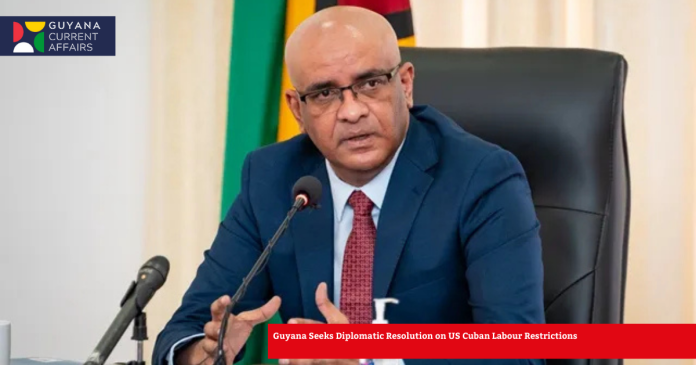In response to the United States’ recent decision to impose visa restrictions on officials involved in Cuba’s labor export programs, Guyana’s Vice President, Dr. Bharrat Jagdeo, has emphasized the country’s commitment to finding a diplomatic solution that satisfies all parties. This stance reflects Guyana’s ongoing efforts to maintain good relations with both the U.S. and Cuba while ensuring the continued presence of Cuban medical professionals in the country.
Background of the Issue
The U.S. has expanded its visa restrictions, targeting officials associated with Cuba’s labor export programs, including the overseas medical missions. The U.S. contends that these programs constitute “forced labor,” enriching the Cuban regime while depriving ordinary Cubans of essential medical care. However, Caribbean leaders, including those from Guyana, have consistently defended the Cuban medical missions, highlighting their critical role in supporting regional healthcare systems.
Guyana’s Position
Vice President Jagdeo has underscored the importance of Cuban medical professionals in Guyana’s healthcare sector, noting that their presence has been invaluable for decades. He emphasized that Guyana will engage the U.S. government through diplomatic channels, seeking a resolution that respects the rights of Cuban healthcare workers while addressing U.S. concerns.
“We don’t do diplomacy in the public, and I believe that we have a strong engagement with the Trump administration and the State Department that would allow this matter to be resolved to the satisfaction of all parties,” Jagdeo stated during a recent press conference.
Regional Support
Guyana’s approach aligns with the broader stance of the Caribbean Community (CARICOM), which has also expressed opposition to the U.S. policy. CARICOM leaders argue that the Cuban medical missions are essential for the region’s healthcare needs, particularly in countries with limited medical resources. Several Caribbean leaders have publicly supported the Cuban program, with some even offering to relinquish their U.S. visas in protest against the policy.
Diplomatic Engagement
Guyana, along with other CARICOM nations, plans to engage the U.S. government directly on this issue. Foreign ministers from the region recently met with U.S. Special Envoy for Latin America, Mauricio Claver-Carone, in Washington, D.C., to discuss the visa restrictions and other matters affecting regional relations.
Conclusion
As Guyana navigates this complex diplomatic landscape, its commitment to finding a mutually beneficial solution reflects the country’s strategic approach to maintaining strong relationships with both the U.S. and Cuba. The ongoing engagement between Guyana and the U.S. on this matter underscores the importance of dialogue in resolving international disputes while preserving critical healthcare services in the region.


